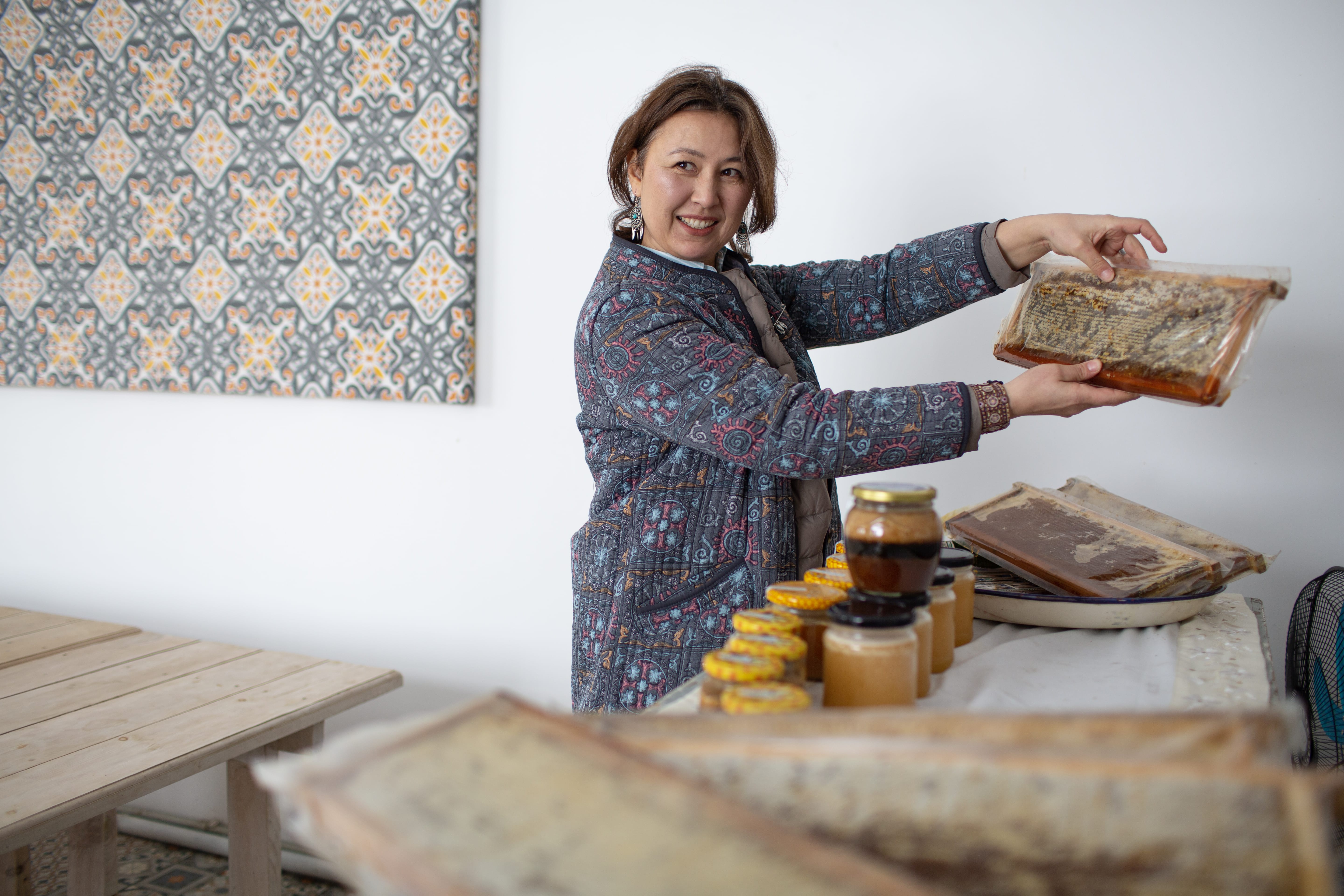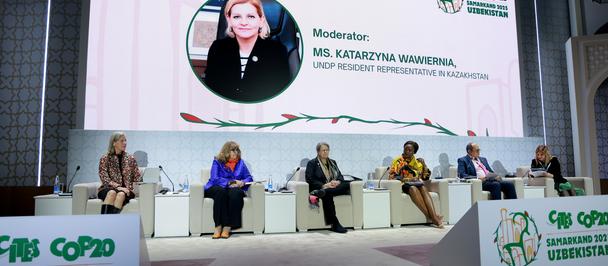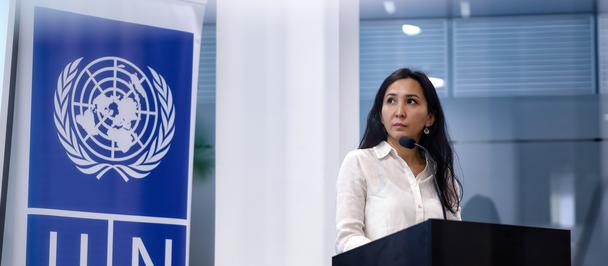Story of Zhanar: from a megalopolis to ecotourism and "green" farming
March 4, 2025

Zhanar Nuraly and her family moved from the capital to the countryside to engage in sustainable farming.
In 2017 Zhanar and her husband, Kanatbek, made a life-changing decision to leave the city lights for green fields: they left behind a fast-paced life in Astana and opted to move to the land.
Today they spend most time on their farm, “Taldy Farm”, 120 km from Almaty, with a picturesque view of the mountains of the Trans-Ili Alatau. They raise sheep, practice beekeeping, take care of horses and host guests from different countries.
For Zhanar, an Astana native, moving south to the countryside was a pivotal challenge. Thanks to her knowledge of three languages, she had built a government career, held positions in the press offices of the Ministry of Foreign Affairs and the Ministry of Finance and raised children with her husband. Fast-paced metropolitan life, filled with official meetings and negotiations, was familiar territory.
But when Kanatbek spoke about change – leaving the capital behind to build their own farm – Zhanar wholeheartedly embraced the idea. Though the transition was challenging, it felt entirely natural to her, as family had always been her guiding compass.
"Although I was used to the rhythm of the capital and the state apparatus, I truly believe that being together and creating a future where our family would be happy is paramount," says Zhanar.


For seven years, Zhanar and Kanatbek have built their farm in Almaty region.
As a first step, they purchased a plot of land in the Almaty region. The land was in a state of degradation, scarred by potholes from licorice extraction, with only a crumbling adobe house standing in its midst. Zhanar and Kanatbek had no prior experience or knowledge in agriculture, but they were determined to learn.
The first step was to restore the soil. Then they bought a breeding herd of Hampshire Suffolk sheep, of which there are about 1,000 on the farm today. An apiary subsequently appeared at the farm which now has 400 bee colonies; an apple garden where chemicals are not used; and natural jam and apple cider vinegar are made from the harvested fruits. The horses are raised for the joy they bring—without them, life on the farm would feel incomplete.



The farm has about 1,000 head of Hampshire Suffolk sheep and goats which produce milk.
Zhanar reflects that in just only a few years she and her husband navigated a challenging journey from white-collar professionals to sustainable farmers.
"You must have an ardent love for the land for it instils patience and rewards that devotion generously," she says.
For Zhanar, farming is primarily about people. Eight local people work on the farm: veterinarian Galiya, engineers Rashid and Zhanibek, shepherds Sardar, Alisher, Bobosher, manager Azamat and beekeeper Feruz. Each is not just an employee, but part of a big family. They celebrate holidays together and support other.
While Zhanar speaks about the farm, beekeeper Feruz is inspecting the hives – by late February the bees remain in hibernation, but soon they will awaken and venture into the blooming meadows.
Eight villagers work on the farm.
The support of loved ones also plays a big role. The eldest son of Zhanar lives in Hong Kong and helps develop the export of farm products. The younger children attend school in Almaty, but every summer they spend time at the farm, learning from their parents' experience. Zhanar's parents also support the family business. Her mother Mariyam often comes from Astana to help her daughter.



Maryiam, Zhanar's mother often comes from Astana to help Zhanar in the family business.
For Zhanar, as a farmer, social responsibility is important. With Kanatbek they launched a charity Kurban-Online.com, which helps socially vulnerable families. In 2024, 300 such families received food assistance. In addition, the farm hosted charitable agricultural tours for the elderly and for children from disadvantaged families.
Ecotourism: Embracing Nature, Preserving the Future
Recently, Zhanar has been actively developing ecotourism. In 2024 six yurts were installed at the farm, and guests from Bangladesh, Belgium, Brazil, China, France, India, Italy and Malaysia stayed there. They do more than just unwind on the farm—they immerse themselves in the local culture, savouring fresh honey and traditional dishes, helping care for the animals and gaining a deeper understanding of Kazakh life.
A seventh yurt is currently being set up and an outdoor gazebo with tapchans, a cafe, toilets and a prayer room have been equipped for guest comfort. With the advent of the tourist season in April -May, Zhanar prepares to welcome new guests and she aims to collaborate with local tour operators to promote and expand ethnotourism in the region.

The yurts, which are set up on the farm, are ready to welcome tourists in spring.
The Almaty region, where the farm is located, is the tourist hub of Kazakhstan. It boasts the mountains of the Northern Tien Shan ny, the Charyn Canyon, the Singing Dune, the Kolsai and the Kayyndy mountain lakes. Zhanar notes that today's travellers seek both natural beauty and immersive experiences, including connections with local traditions and lifestyles. However, she highlights key challenges in developing ecotourism, such as inadequate rural infrastructure and an overemphasis on mass tourism rather than niche, sustainable alternatives.
"We need both to attract tourists and to create high-quality products that combine nature and an authentic lifestyle," says Zhanar.


Honey from the Zhanar apiary is an organic product that is also presented to guests of the farm.
In 2024, Zhanar was one of the 25 participants in the mentoring programme organized by the United Nations Development Programme (UNDP), which supports rural women in the development of ecotourism. She acknowledges that the programme enabled her to seet= her farm as part of a larger global movement.
"The programme has imparted valuable knowledge in strategic planning, marketing and analytics. But key is that I have connected with like-minded women who are also building businesses on the land. These projects give women the tools and confidence to move forward," says Zhanar.


In 2024, Zhanar participated in a mentoring programme of UNDP, which supports women entrepreneurs in ecotourism.
On their future plans, Zhanar notes that with Kanatbek they intend to develop the farm as an ecological project. One of the steps is to switch to cyclic production. Recently a biogas plant was installed at the farm, soon it will start processing sheep waste into biofuels. The next step is processing sheep’s wool, a move that will bring the farm closer to achieving complete zero-waste sustainability.
"We cannot treat resources thoughtlessly. Climate change is a reality, and sustainable entrepreneurship is not just a trend, it is a necessity," - says Zhanar.

Switching to zero-waste production is one of the next steps in the development of a "green" farm.
While Zhanar is developing the farm and ecotourism, Kazakhstan is undergoing large-scale changes in its approach to sustainable tourism. The national standard for ecotourism, developed by the Biodiversity Finance Initiative (BIOFIN), will enter into force in June 2025. It will establish key principles of responsible tourism, such as minimizing environmental impact, conserving biodiversity, adopting "green" technologies and using resources efficiently.
Today, Zhanar farm already follows these principles: caring for the land, developing cyclic production, offering guests an immersion in a traditional way of life and creating an eco-friendly tourist product.



Photo: UNDP Kazakhstan/Zhanara Karimova
Zhanar continues to develop her “green” business, combining family traditions, caring for the land and striving for a sustainable future. She sees that with each new step – whether in ecotourism, circular production, or involvement in global initiatives – her work is contributing to a larger movement for change.

 Locations
Locations












